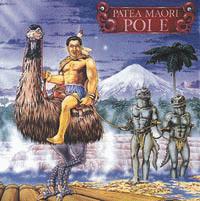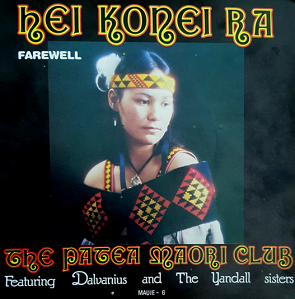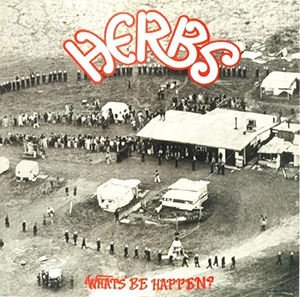Traditional Māori music, or pūoro Māori, is composed or performed by Māori, the indigenous people of New Zealand, and includes a wide variety of folk music styles, often integrated with poetry and dance.
Maui Dalvanius Prime was a New Zealand entertainer and songwriter. His career spanned 30 years. He mentored many of New Zealand's Māori performers, and was a vocal and forthright supporter of Māori culture.

Herbs are a New Zealand reggae group founded in 1979 and led by singer-guitarist Dilworth Karaka, the only constant member. Since its foundation Herbs has been multi-ethnic in membership and featured Samoans, Tongans, Cook Islanders, New Zealand Europeans and Maori members. The 11th inductees into the New Zealand Music Hall of Fame, were once described as "New Zealand's most soulful, heartfelt and consistent contemporary musical voice". It has been said their debut EP What's Be Happen? "set a standard for Pacific reggae which has arguably never been surpassed".

Urban Pasifika is a New Zealand subgenre of hip hop, that developed primarily among Pasifika New Zealanders in South Auckland. Drawn from alternative hip hop and R&B influences, it was quickly blended with Pacific Island or Māori instrumentation and traditional songwriting and singing and rapping in a variety of Polynesian languages, such as Māori, Samoan, Niuean and Tongan. The genre's genesis in the 1980s blossomed into a unique, globally enrapturing cultural scene in its homeland of Auckland, especially in the next decade. Urban Pasifika is one of the most popular music genres to arise from New Zealand, and helped cement Auckland's reputation on the world stage as a major cultural centre, and the most ethnically Polynesian city in the world.
The following lists events that happened during 1987 in New Zealand.
Pacific reggae is a style of reggae music found in the Pacific. This style is found in Polynesia, and Melanesia. Within this genre there are differing styles, for example between the New Zealand reggae sound, and that found in the Pacific Islands. According to Herbs co-founder Dilworth Karaka, it is a phrase UB40 came up with.

Poi E is an album released by New Zealand Māori music group the Pātea Māori Club. In 1984, the Māori language title track "Poi E" topped the New Zealand pop charts for four consecutive weeks, and was that year's biggest selling single - outselling all international recording artists.
The Yandall Sisters were a popular New Zealand-born Samoan all-female singing group of the 1970s, who made a major contribution to music in New Zealand. The members of the group were Caroline, Mary and Adele Yandall, and later younger sister Pauline Yandall.

"Poi E" is a song by New Zealand group Pātea Māori Club off the album of the same name. Released in 1983, the song was sung entirely in the Māori language and featured a blend of Māori cultural practices in the song and accompanying music video, including Māori chanting, poi dancing, and the wearing of traditional Māori kākahu (garments). The song reached No. 1 in New Zealand in each of the following three decades.

"Ngoi Ngoi" is a song by Pātea Māori Club. Originally included in the band's 1987 debut album Poi E, it was released as a single in 1988. A Māori language pop/Gospel song, it was written as a tribute to lyricist Ngoi Pēwhairangi by Dalvanius Prime and people from her community in Tokomaru Bay who were close to her. The single did not chart in the top 40 singles in New Zealand, however was nominated for Best Polynesian Album at the 1988 New Zealand Music Awards.

"Sensitive to a Smile" is a single from the New Zealand reggae band Herbs from the Sensitive to a Smile album. The single reached #9 in the New Zealand chart.
The 2012 APRA Silver Scroll Awards were held on Thursday 13 September 2012 at the Auckland Town Hall, celebrating excellence in New Zealand songwriting. The Silver Scroll Award was presented to New York-based pop artist Stephanie Brown (Lips), and reggae band Herbs was inducted into the New Zealand Music Hall of Fame.

Ria Hall is a Māori recording artist and presenter on Maori TV's AIA Marae DIY in 2012-13.
Pātea Māori Club is a New Zealand cultural group and performance act formed in the South Taranaki town of Pātea in 1967 as the Pātea Methodist Māori Club. In 1983, the group began to release Māori-language pop and hip hop music, produced by Dalvanius Prime with lyrics by Ngoi Pēwhairangi. Their first single, "Poi E", reached number one on the New Zealand top 50 singles chart in 1984.

"Aku Raukura", also known as "Raukura", is a song by Pātea Māori Club. Originally written in sessions with Ngoi Pēwhairangi and Dalvanius Prime in Tokomaru Bay in 1982, it was released as their second single in June 1984, during the chart success of their debut hit "Poi E". The song peaked at number 10 in New Zealand, and was later included in their 1987 debut album Poi E.

"Hei Konei Rā", also known as "Hei Konei Ra (Farewell)" on its original release, is a song by Pātea Māori Club. Originally written in sessions with Ngoi Pēwhairangi and Dalvanius Prime in Tokomaru Bay in 1982, it was released as their third single in late 1984 or early 1985, prior to the band's tour of the United Kingdom. The song peaked at number 21 in New Zealand, and was later included in their 1987 debut album Poi E.
"E Papa Waiari", also known as "E Papa Wairangi" is a traditional Māori song, often used in tītī tōrea, a type of whakaraka played by passing tītī while seated, in time to a rhythmic song.
Sons of Zion is a six-member New Zealand reggae band who formed in 2007 in Pakuranga, Auckland. They became widely famous in New Zealand in early 2018, due to the popularity of their single "Drift Away".

"Kua Makona", is the debut single from Moana Maniapoto. Produced by Dalvanius Prime and sung in the Māori language, the song was used in a campaign for the Alcohol Advisory Council of New Zealand. In 1993, the song was re-recorded as a pop-reggae version entitled "Kua Makona ", released as a single by Maniapoto's group Moana & the Moa Hunters. This version was later included on their debut album Tahi (1993).

What's Be Happen? is the debut studio album by New Zealand reggae band Herbs. The album was released in July 1981 on the eve of the 1981 Springbok tour by Warrior Records, only the second album to be released by the label at that point. What's Be Happen? is often seen as the first album of both Pacific and New Zealand reggae, blending reggae themes and styles with traditional Polynesian rhythms and musical structure. This is seen through elements such as the use of Cook Islands pātē on the title track and frequent use of the so-called "Māori strum" method of guitar on tracks throughout the record. As a result, the album has been described as representing a watershed moment in the development of a distinct form of reggae within New Zealand and establishing Herbs as a prominent band within that.











